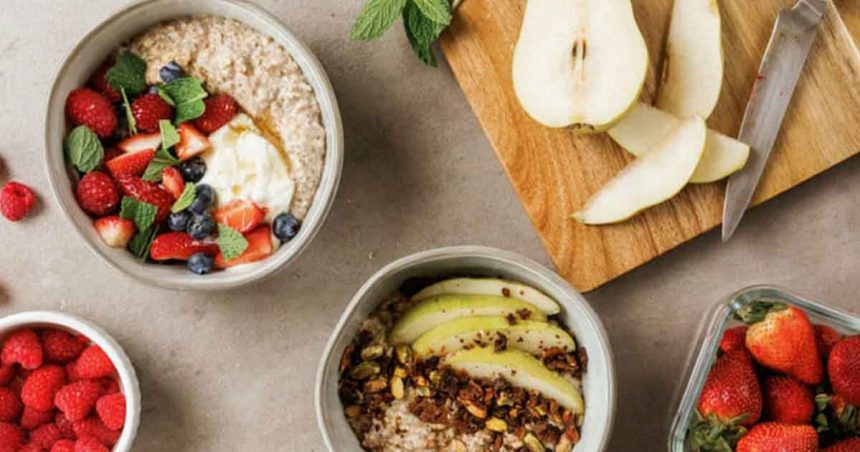Inflammation in the body serves as a natural response to damage, with the immune system releasing chemicals to address the issue and increase blood flow. However, if this response persists and becomes chronic inflammation, it can lead to damage to tissue or organs. Individuals dealing with chronic inflammation may experience issues like fatigue, digestive problems, and pain, and it can even contribute to chronic illnesses such as arthritis or heart disease. To reduce inflammation in the body, experts often recommend incorporating anti-inflammatory foods into the diet.
“Eating Anti-Inflammatory Foods for Breakfast”:
“Foods can play a key role in reducing inflammation, depending on the antioxidants, vitamins, and minerals they contain,” explains Amy Shapiro, MS, RD, CDN, founder of Real Nutrition. “On the other hand, foods high in sugar, processed ingredients, and chemicals can actually increase inflammation.” Shapiro and Rhyan Geiger, RD, owner of Phoenix Vegan Dietitian, suggest starting the day with a nutritious breakfast to boost energy levels, improve cognition, and set a positive tone for the rest of the day. Avoiding sugar crashes can prevent cravings for unhealthy snacks.
Here are some anti-inflammatory foods to include in your breakfast:
1. Oatmeal: A gluten-free grain high in fiber that aids in balancing blood sugar and reducing cholesterol levels. Top with berries, fresh fruit, dark chocolate, or nuts for added anti-inflammatory benefits.
2. Tomatoes: Rich in potassium, vitamin C, and lycopene, known for its antioxidant properties that help lower inflammatory compounds linked to cancer. Pair tomatoes with a source of fat like seeds, nuts, or olive oil for optimal absorption.
3. Olive oil: Packed with monounsaturated fats that can reduce the risk of obesity, heart disease, and brain cancer. Extra virgin olive oil also contains oleocanthan, an antioxidant with anti-inflammatory properties similar to ibuprofen.
4. Berries: Add berries such as goji, raspberries, or blueberries to oatmeal or smoothies. Berries contain anthocyanins that help reduce inflammation and lower the risk of disease.
5. Avocado: Rich in carotenoids, tocopherols, fiber, potassium, magnesium, and monounsaturated fats that support heart health and reduce the risk of chronic diseases.
6. Fatty fish: Sardines, salmon, mackerel, and other fatty fish are excellent sources of omega-3 fatty acids that work to reduce inflammation in the body.
7. Broccoli: Filled with fiber, nutrients, and the antioxidant sulforaphane, which helps reduce the amount of inflammation-making molecules in the body.
8. Green tea: Contains antioxidants and anti-inflammatory properties, including epigallocatechin-3-gallate, that reduce the production of pro-inflammatory molecules.
9. Peppers: Bell peppers and chili peppers are rich in vitamin C and antioxidants that lower inflammation associated with chronic illnesses.
10. Grapes: Packed with anthocyanins and resveratrol, compounds that reduce the risk of arthritis, diabetes, obesity, Alzheimer’s, and heart disease.
11. Turmeric: Contains curcumin, an active compound with anti-inflammatory effects that can be beneficial when added to curries or turmeric lattes.
12. Dark chocolate: Rich in flavanols that reduce the risk of disease and promote healthier aging when consumed in moderation.
13. Tofu: High in isoflavones that help reduce inflammation and lower the risk of diseases associated with inflammation.
14. Oranges: Loaded with nutrients like vitamin C, potassium, fiber, calcium, and folate that support heart health and boost the immune system.
15. Carrots: Contain beta-carotene, lutein, zeaxanthin, and antioxidants that help lower inflammation and prevent damage to healthy cells.
16. Leafy vegetables: Spinach, Swiss chard, and kale are excellent sources of vitamins, antioxidants, and nutrients that reduce inflammation in the body.
17. Onion: Rich in quercetin, a flavonoid that lowers inflammation related to diseases like arthritis.
18. Beets: Contains betalains and antioxidants that reduce inflammation and may help reduce the risk of cancer.
19. Ginger: Contains compounds that reduce pro-inflammatory chemicals and help lower inflammation in the body.
20. Cherries: Particularly tart cherries are high in antioxidants like anthocyanins and catechins that lower inflammation and decrease the risk of chronic inflammatory diseases.
21. Walnuts and almonds: Packed with healthy fats and antioxidants, walnuts and almonds offer anti-inflammatory benefits and are easy to incorporate into the diet.
By selecting anti-inflammatory foods for breakfast, individuals can kickstart their day with a nutrient-rich meal that supports overall health and well-being. Making these dietary changes can help reduce chronic inflammation and lower the risk of associated diseases. Remember to balance the variety of foods to provide a wide range of nutrients essential for optimal health.






